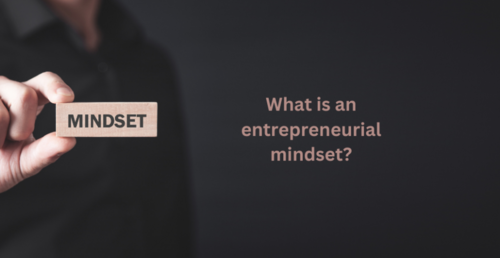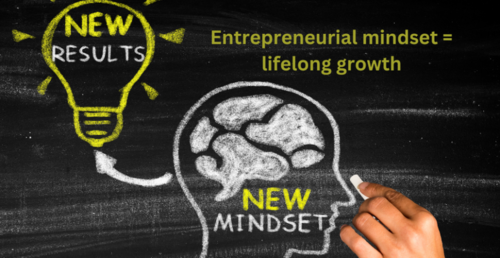
What does it mean to have an Entrepreneurial Mindset, and why is it Important?

Why an Entrepreneurial Mindset Is Essential for Success in Today's Knowledge Economy.
Do You Really Have What It Takes to Succeed as an Entrepreneur?
Here's why an entrepreneurial mindset is crucial for academics looking to become successful business owners, leaders or entrepreneurs.
Creating an entrepreneurial mindset is a critical component for academics looking to become successful business owners, leaders or entrepreneurs — whom I refer to as academipreneurs. By using digital platforms, innovative technologies, massive open online tools (e.g., MOOCs) and proven business practices to establish and promote their own unique brand, entrepreneurial intellectuals can stand out in a crowded academic labor market, attract new funding and partnerships, seize new opportunities and boost their credibility as subject matter experts in their respective field.
How to Cultivate an Entrepreneurial Mindset to Be Successful in Business
.png)
Looking back, it frustrates me how my teachers were so concerned with students getting good jobs, but never even mentioned that we could start our own business instead.
This is even more frustrating when you consider where most jobs come from: People who decide to carve their own path, start a business, and employ others.
What gives?
After a few years of trying—and many failed businesses—I finally learned how to think like an entrepreneur.
The payoff? Good money, fun work, constant travel, and freedom. Not bad, right?
If you want to learn how to develop an entrepreneurial mindset so you can build a successful business, you’re in the right place. In this article, we’ll explore 20 essential entrepreneurial mindset characteristics.
But first, what does it mean to have an entrepreneurial mindset, and why is it important?

An entrepreneurial mindset is a set of beliefs, thought processes, and ways of viewing the world that drives entrepreneurial behavior. Typically, entrepreneurs firmly believe it’s possible to improve their life situation and live life on their own terms. They also believe in their ability to learn, grow, adapt, and succeed.
The mindset of successful entrepreneurs is different from the mindset of traditional workers in many ways.
For example, if a traditional worker needs to earn more money, they’ll often brush up their résumé and look for a better paid job. However, someone with an entrepreneurial spirit would look for ways to earn money by starting or growing a business.
Here’s the thing: Anyone can develop the mindset of a successful entrepreneur. As the founder of Ford Motor Company, Henry Ford, once said, “Whether you think you can or think you can’t—you’re right.”

The power of an entrepreneurial mindset is obvious when you think about it. Entrepreneurs succeed like they do because they think, act, and view the world differently from most people.
There are so many reasons why an entrepreneurial mindset matters. For example, developing an entrepreneurial mindset can help to reduce doubt, fear, and anxiety. It can also help to drive action, focus, and growth.
In short, an entrepreneurial mentality is the foundation of business success. Now, let’s explore how entrepreneurs think.

If you want to learn how to build an entrepreneurial mindset, you need to know how successful entrepreneurs think. So, let’s take a closer look at 20 essential entrepreneurial mindset characteristics.
This is one of the most important aspects of the entrepreneurial mindset.
Entrepreneurs don’t follow the crowd or look to others to be given instructions. Instead, they listen to their gut and carve their own path.
As Apple’s founder, Steve Jobs, said, “Don’t let the noise of others’ opinions drown out your own inner voice.”
The independent mindset of successful entrepreneurs stems from taking full responsibility.
Entrepreneurs don’t blame others for their life situation—they empower themselves by taking responsibility for improving it.
Failure, success, life circumstances—it doesn’t matter what it is. Even if something isn’t your fault, by taking responsibility for it, you’re empowered to improve it.
A key to entrepreneurial success is abundance.
Successful entrepreneurs know they can improve a situation, make more money, and create new opportunities.
The sky is always the limit.
As a result, entrepreneurs don’t hoard money or knowledge. They’re open, generous, and understand that “you get what you give.”
The author and entrepreneur Robert Kiyosaki once wrote, “I have never met a rich person who has never lost any money. But I have met a lot of poor people who have never lost a dime.”
Entrepreneurial thinking is goal-orientated.
In other words, successful entrepreneurs don’t have wishes and dreams—they have goals and plans.
So, when creating an entrepreneurial mindset, set SMART goals—goals that are:

When learning how to think like an entrepreneur, you need to look at failure differently than most people.
Entrepreneurs don’t fear failure—they appreciate it.
Each “failure” is simply a stepping stone to learn from, helping move you closer to success. As the famous inventor Thomas Edison said, “I have not failed. I’ve just found 10,000 ways that won’t work.”
Failing at something certainly doesn’t mean that you’re a failure—just that something didn’t work out as you’d hoped, and you need to try again.
Stanford University psychologist Dr. Carol Dweck studied failure and said, “For 20 years, my research has shown that the view you adopt for yourself profoundly affects the way you lead your life.”
Specifically, she found that there are two main types of mindset: fixed and growth.
Someone with a fixed mindset believes that who they are is relatively permanent and they can’t change very much.
The entrepreneur mindset is growth-oriented.
Entrepreneurs believe they can grow as people, learn new things, and develop new skills. They believe that—with some consistent effort—they can shape themselves into whomever they want to be.
The bestselling author and entrepreneur Hal Elrod said, “Your level of success will rarely exceed your level of personal development, because success is something you attract by the person you become.”
In other words, personal growth tends to create success. So, keep trying to improve yourself.
The most successful entrepreneurs aren’t worried about looking cool—they just want to succeed, and they know that learning from feedback will help speed up the process.
Dweck said, “Why waste time proving over and over how great you are, when you could be getting better?”
In short, don’t look for validation, seek feedback.
.jpg)
Most people spend their spare time seeking entertainment, whether it’s through social media, Netflix, gaming, reading novels, or hanging with friends.
However, entrepreneurial thinking is more concerned with learning and development. For example:
As the entrepreneur and speaker Jim Rohn said, “Formal education will make you a living; self education will make you a fortune.”
If you want to learn how to think like an entrepreneur, you need to think long term.
The famous billionaire investor Warren Buffett said, “Someone is sitting in the shade today because someone planted a tree a long time ago.”
Successful entrepreneurs know that big goals take a long time to achieve. So, they start with their goal and work backward, reverse-engineering every step of the way. In other words, “If I want this, I need to do that. But to do that, I need to do this,” and so on.
They keep working and are patient when it comes to rewards—they know that the tortoise always beats the hare.

Many people struggle with self-acceptance. When you don’t like something about yourself, it’s easy to devalue or even hate yourself.
But if you develop a growth mindset, you know you can always change and improve.
So, successful entrepreneurs accept themselves as they are, warts and all. They know who they are is transient, and they’re working on becoming the person they want to be.
Entrepreneurs know that the only thing holding us back is ourselves (because they take full responsibility, remember!).
As a result, they practice self-awareness.
They pay close attention to their strengths and weaknesses, which allows them to improve faster and play to their strengths.

Great businesses require teamwork—after all, Jeff Bezos didn’t build Amazon alone. So, if you want to think like an entrepreneur, you need to think in terms of “we” instead of “I.”
There’s an African proverb that says, “If you want to go fast, go alone. If you want to go far, go together.”
As a result, successful entrepreneurs think collaboratively and practice their leadership skills.
It’s not easy to become a business owner.
As the famous management consultant Peter Drucker said, “Whenever you see a successful business, someone once made a courageous decision.”
But this doesn’t mean entrepreneurs don’t have self-doubt.
Nelson Mandela, the activist and former president of South Africa, explained, “I learned that courage was not the absence of fear, but the triumph over it.”

Courage leads to an essential entrepreneurial mindset characteristic: learning to be comfortable with discomfort.
Growth and expansion require you to move beyond your comfort zone. So, when developing an entrepreneurial mindset, practice leaning into uncomfortable situations, such as rejection.
For example, after realizing his fear of rejection was holding him back, the entrepreneur and keynote speaker Jia Jiang spent 100 days getting rejected on purpose.
Entrepreneurs have big goals, and they know it’s impossible to see the entire staircase before climbing. But they climb anyway, safe in the knowledge that they can always adapt to new developments.
For example, if your first product fails, try another one. And if your Facebook ads still don’t generate sales, hone your skills.
.png)
Entrepreneurs develop critical thinking and try to solve problems.
If you think about it, this is the essence of every business. For instance, plumbers fix broken pipes, Netflix cures boredom, and car manufacturers help people get around.
Brian Chesky, the co-founder of Airbnb, said, “If we tried to think of a good idea, we wouldn’t have been able to think of a good idea. You just have to find the solution for a problem in your own life.”
Drive is an essential part of the entrepreneurial mind. Entrepreneurs are self-motivated and driven to achieve their goals. They work hard and enjoy the ride, knowing that they’ll reap the rewards down the line.
The entrepreneur Mark Cuban said, “It’s not about money or connections. It’s the willingness to outwork and outlearn everyone when it comes to your business.”
Similarly, entrepreneurs set out to achieve their goals come hell or high water. When the going gets tough, they stick with it—they don’t give up.
As Henry Ford said, “When everything seems to be going against you, remember that the airplane takes off against the wind, not with it.”

Successful entrepreneurs are focused on achieving their goals, never procrastinate, and always prioritize the most important tasks.
To do this, ask yourself, “Will this help me to achieve my long-term goals?” If the answer is yes, then ask, “Is this the most important thing to do right now?”
“Wantrepreneurs” like to read books, watch videos, and make plans, but they never actually get down to business and work.
Aspiring entrepreneurs have a bias for action. They know that knowledge without action is meaningless. As the animator and entrepreneur Walt Disney said, “The way to get started is to quit talking and begin doing.”
The entrepreneurial mind is decisive.
Entrepreneurs must confront problems and make many decisions every day—often with inadequate information to help.
Successful entrepreneurs decide and then get back to work. They know that “you can always edit a bad page. You can’t edit a blank page,” as the author Jodi Picoult said.
So practice decisiveness—for example, next time you’re in a restaurant, look at the menu once, decide, and order with confidence.

Having an entrepreneurial mindset will allow you to think, act, and perceive the world differently from the average worker, setting the foundation for success.
Now, you can’t develop an entrepreneurial mindset overnight.
But, by understanding some key entrepreneurial skills and traits, you can watch your behavior and learn how to think like an entrepreneur. In summary, here are 20 entrepreneurial mindset characteristics:
Do you share the entrepreneurial mentality?
Do you have ideas on how to practice these mindset characteristics?
Markethive - a Powerful Ecosystem for Entrepreneurs.

MarketHive is an entrepreneurial social marketing platform with the combined strength of LinkedIn, Amazon, Facebook and Marketo.
Markethive is at the forefront of marketing in today's online environment.
It's the perfect marketing platform for online marketers, businesses, affiliate marketers, brands, cryptocurrency enthusiasts, investors and anyone else that requires an online presence.
More info HERE <<<<
(5).jpg)
About: Andries vanTonder
Over 40 years selfemployed
He is a Serial Entrepreneur, an Enthusiastic supporter of Blockchain Technology and a Cryptocurrency Investor
Find me at my Markethive Profile Page | My Twitter Account | My Instagram Acount | and my Facebook Profile.
